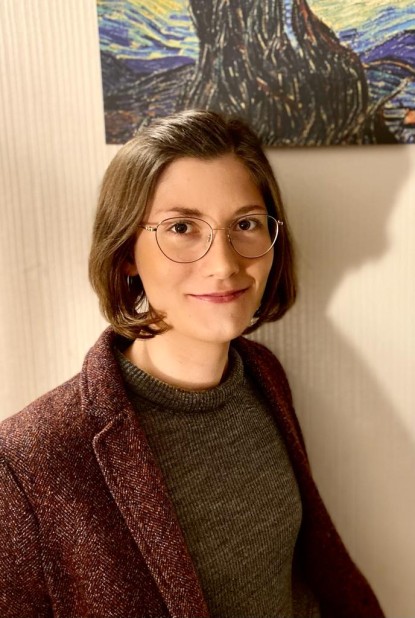Jeannine Honig M. Ed.
Tutor
Working area(s)
Contact
jeannine.honig@tu-...
Work
S3|12 402
Residenzschloss 1
64283
Darmstadt
Since June 2024
Research assistant and doctoral candidate in the Emmy Noether Research Group “KoLT” at the Department of History of Technology at Darmstadt Technical University.
2022
Student assistant to Prof. Dr. Kevin Liggieri at the Department of History of Technology at Darmstadt Technical University.
2021
Tutor at the Department of History of Technology at Darmstadt Technical University.
2021-2023
Tutor at the Institute for Vocational Education and General Education at Darmstadt Technical University.
June
Degree: First state examination for teaching at secondary schools in the subjects of philosophy/ethics and history at Darmstadt Technical University.
Dissertation project
Learning in technical environments. Virtual reality and the transformation of “learning environments” 1960-2014
Project outline:
In the course of virtual reality research since 1960, learning with machines has been reinterpreted. Not only learning with technology, but also learning in machine environments has gained scientific, economic, and public relevance. The “immersion” of learners in an artificial reality has enabled a new definition of “learning subject” and “learning environment.” Learning subjects were now expected to actively shape their learning environment and physically interact with and within it. The learning environment was to be individually adaptable and motivating for learning subjects. Such learning concepts, which were geared toward interactivity between the learning environment and the learning subject, provided the basis for today's digital learning environments.
Since the mid-20th century, technology has promised new learning environments that are available regardless of time and place. This dissertation project examines how, between 1960 and 2014, VR research integrated, transformed, and instrumentalized learning theory assumptions and generated new learning concepts (including physical-spatial learning). From the 1960s onwards, the idea of a learning subject whose body was closely linked to the technical environment increasingly replaced the idea of a psychological (feedback) learning process. The project analyzes how the development of virtual learning environments generated a new postulate of the situatedness and physicality of knowledge and learning. How could learning be understood as contextually (environmentally) bound through VR developments? What happens when the formerly cognitive learning subject is conceived in a technical learning environment as a “body” that moves in space?
The Constructivism in the Turtle: How Piaget's Learning Theory Became the Foundation of Early Robotics Technology by Seymour Papert – Herausforderungen der Technik. Transatlantischer Workshop zur Geschichte der Mensch-Maschine-Beziehung im 20. Jahrhundert, an der Technischen Universität Darmstadt, 24.05.-25.05.2024
Der Körper als Instrument zur Erkenntnisgewinnung: eine quellenkritische Analyse des „Learning Wall System“ – Studientag an der Friedrich-Schiller-Universität Jena, 13.03.2025

